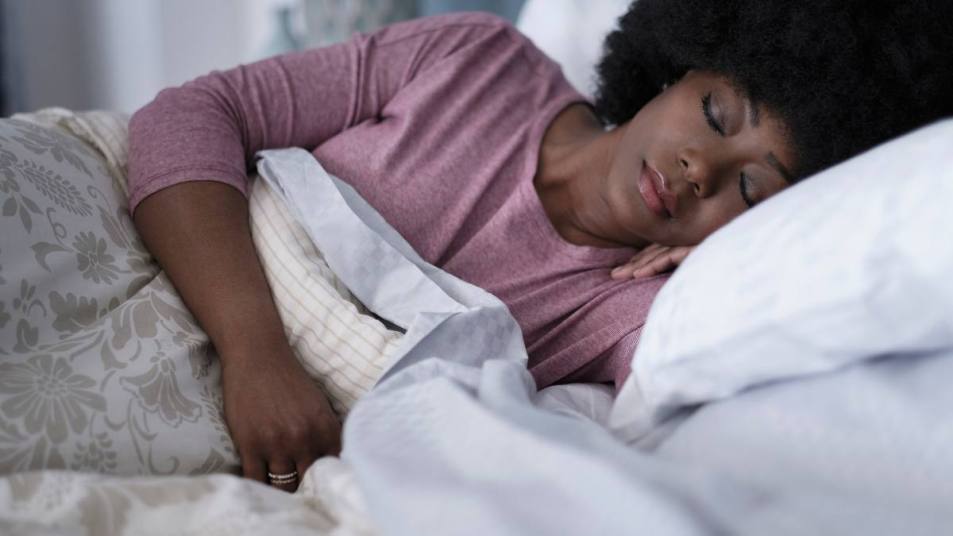6 Science-Backed Ways to Get Deeper Sleep — And They Can Start Working Tonight
Yes, you can enjoy more zzz's — no meds needed

Sometimes even the littlest changes to your routine can have the biggest impact on your sleep. One of the sneakiest culprits: daylight saving time. That slight time change can throw your body out of whack and leave you tossing and turning. The good news? Whether you’re facing a time change or just need extra help getting some zzz’s, we’ve got easy tips for sleeping that will make all the difference. Keep reading and start sleeping deeper tonight.
1. A bergamot sniff stops tossing and turning
Adjusting to daylight-saving time (DST) can up your risk of restless sleep and middle-of-the-night awakenings. Thankfully, scientists out of Texas Health Harris Methodist Hospital have found just cozying up in a bedroom that’s lightly scented with bergamot essential oil can help you sleep 39% more soundly, plus it halves your risk of waking throughout the night. Bergamot contains an aromatic compound, linalool, that acts as a gentle natural sedative when it reaches the brain’s limbic system. To do: Place three drops of bergamot oil on a cotton ball and leave it on your bedside table at night.
Related: Meet the Wrinkly Italian Fruit Whose Extract Reduces Bad Cholesterol and Increases HDL
2. Tips for sleeping: Greeting the sun resets the body clock
Getting a pop of bright light within an hour of your usual wake-up time can readjust your body’s internal clock (and erase DST-triggered sleep troubles) in as little as 24 hours. That’s the word from researchers out of Rush University Medical Center, who have discovered that your internal clock resets itself every single day — as long as it receives a blast of morning light. Get as little as five minutes of sun exposure soon after waking, and your body clock will switch on production of alertness hormones (endorphins and orexin), then tamp down their release, so you’ll get sleepier, as bedtime nears.
3. A warm splash triggers relaxation

The time change combined with brighter evenings can rattle your sympathetic nervous system, triggering sleep-disrupting edginess, tension and anxiety. The good news? If you’re feeling too restless to relax at bedtime, soaking a washcloth with soothingly warm water and holding it against your face can induce a deep sense of calm in less than 15 seconds. Saint Louis University investigators explain that the sensation of water on your face triggers the mammalian diving reflex — an involuntary phenomenon that instantly calms the sympathetic nervous system, slowing heart rate, lowering blood pressure, relaxing muscles and quashing stress.
4. Tips for sleeping: An afternoon stroll hastens sleep onset
Until your brain adjusts fully to the time change, it can take you an additional 32 minutes to fall asleep every night. But heading outside for an afternoon or evening stroll, ideally between 2 pm and 9 pm, can prevent this problem entirely, helping you wake up feeling 40% more alert and well-rested each morning, Hungarian scientists report. Gentle exercise, as long as it’s later in the day, signals your brain to produce 54% more of the sleep hormone, melatonin, at bedtime, plus it dials down your adrenal glands’ release of an insomnia-fueling stress hormone, cortisol.
Related: Women Over 50 Are Losing 100+ lbs Without Dieting Just By Walking First Thing In the Morning
5. Nature videos calm a busy mind
Thinking, planning, organizing, worrying… if a busy brain is making your DST sleep troubles worse, try stretching out and watching a cheery nature video just before bedtime. Research out of Clemson University, South Carolina, suggests spending as little as 4 minutes gazing at wildlife quickly soothes an overactive brain, helping you shrug off your worries and fall asleep up to 30% faster. The reason? Focusing on furry or feathered creatures prods your brain to release an anxiety-soothing hormone, oxytocin. More good news: You can get the same sleepiness-boost by gazing at your own pets while they play or snooze in the evening!
6. Tips for sleeping: Planting your seedlings restores energy
This is the perfect time of year to start growing tomatoes, peppers and other seedlings indoors. And doing a little light gardening (even indoor gardening) can quash time-change sluggishness in as little as two minutes, and it will double your focus, energy and stamina if you do it daily, Bulgarian research suggests. That’s because exposure to plants stimulates a key branch of nerves (the parasympathetic nervous system) that encourages the flow of oxygen-rich blood to brain and muscle cells, helping you feel calm, clear-headed and energized all day long.
Related: Can Houseplants Improve Air Quality? 3 Types That May Improve Allergies, Headaches, and Sleep
For more on sleep, click through the links below!
Tossing and Turning at Night? Ashwagandha Is an Ancient Herb That Deepens Sleep Naturally
Doctors Reveal the Best Sleeping Position to Outsmart Nighttime Leg Pain
Fennel Tea Can Ease Bloat, Calm Stress + Boost Sleep — How to Brew It for Pennies













